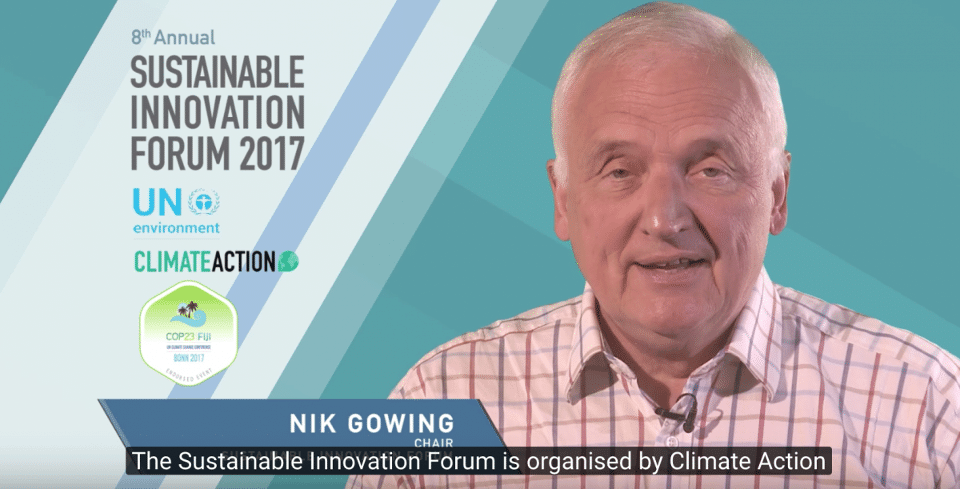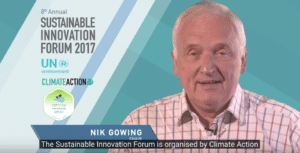UN Environment Program Rejects WNA’s Money. Won’t Allow Sponsorship Of Sustainable Innovation Forum (SIF17)
The UN Environmental Program (UNEP) has rejected the World Nuclear Association’s (WNA) offer to provide financial support to the 8th Annual Sustainable Innovation Forum (SIF).
Described by its chairman as the “largest business-focused side event during the annual Conference Of Parties” the event is scheduled to take place alongside COP23 in Bonn, Germany. Originally accepted as a gold sponsor and ready to pay the £40,000 ($68,338) fee, WNA was recently notified that its sponsorship had been rescinded upon intervention by the UN Environment Program (UNEP).
The original rejection was accompanied by a tentative offer for a lesser sponsorship that did not include any branding or overt credit, but even that offer was later vetoed by the UNEP.
UNEP, an organization whose mission is ‘To provide leadership and encourage partnership in caring for the environment by inspiring, informing, and enabling nations and peoples to improve their quality of life without compromising that of future generations’ will not even take the nuclear industry’s money and allow it to explain how its technology could contribute to an enhanced accomplishment of that mission.
As reported in an article published in The Australian titled UN accused of bias as energy forum excludes nuclear Naysán Sahba, a spokesman for UNEP, explained the decision as follows.
“We prioritise the renewables revolution, such as wind and solar energy, as well as encouraging the ongoing shift from fossil fuel,’’ Mr Sahba said.
“Our work on the nuclear sector is limited.”
That position employs specious logic. No one was asking the UNEP to stop promoting wind and solar or even to explain to anyone why nuclear energy should or should not be considered as a clean energy technology. However, no one at WNA was expecting such a firm rejection from an organization that has long recognized the immediate need to reduce CO2 production from energy.
By making a financial commitment to sponsor SIF17 in Bonn, the nuclear industry was trying to follow the lead of industrial organizations like BMW and Toyota, two of the world’s largest producers of automobiles driven by internal combustion engines burning gasoline, Orstead, a utility that continues to operate coal fired power stations and Deutsche Post DHL Group, a logistics company that operates fleets of aircraft and trucks.
All four of those organizations are headline or gold level sponsors of the 2017 Sustainable Innovation Forum.
Perhaps part of the problem is that the World Nuclear Association does not have a conversion story to share about how it has seen the light and decided to redirect its fossil fuel focus to stop burning stuff in a few decades.
Instead, the organization represents an industry that has been specializing in producing energy with a minimum level of CO2 and other polluting by-products for more than 50 years.
David Hess, a policy analyst and communication manager for WNA, expressed his organization’s deep disappointment at being rejected from conference sponsorship. They were looking forward to the opportunity to be in a room full of serious people talking about effective ways of addressing some of the world’s most pressing problems.
Ben Heard, the executive director of Bright New World, a climate and energy focused NGO, told The Australian that he was gobsmacked to see such a blatant example of bias and prejudice.
“I’m an advocate for this technology on environmental grounds but it struggles, and part of the reason is time after time it faces this kind of institutional bias which means no-one can even have a conversation about it.”
When contacted, Heard acknowledged that some participants in the event might have been uncomfortable confronting evidence supporting the disturbing notion that nuclear energy is clean. He emphasized the importance of accepting new ways of thinking.
“If institutions cannot deal with even this small amount of discomfort, we have no chance of coming together to resolve a challenge like climate change.”
Mathijs Beckers, a Dutch author of several climate and energy books, made the following observation.
“Our leaders are pretending to work on a solution to poverty and climate change, but they are still considering useless shiny things at the boutique, while the real solutions lie in the hardware store.”
Eric Meyer, the Founder and Executive Director of Generation Atomic, an NGO founded by millennials deeply concerned about the world they are inheriting made the following observation.
“With nuclear energy, we actually have a shot at decarbonizing in time–France, Sweden, and Ontario have demonstrated this. For now, it appears that we live in a world where politics and fear trump facts and science, even at the UNEP. We must work to change that, before it’s too late.”
The world’s need for abundant clean energy is too pressing to address it from predetermined positions that prevent thorough consideration of all available technologies.
Kirsty Gogan, co-founder and Global Director of Energy for Humanity provided her observations on the UNEP’s decision to exclude nuclear energy’s global trade group.
“UNEP have exposed an institutional bias that is nothing to do with solving environmental problems, and everything to do with marketing pet technologies.
“Nuclear energy is the only proven way to transition from coal to clean electricity generation. Nuclear energy has problems with high costs and low public confidence, but without it, there is an even greater risk that we will miss our climate targets.
“This is why anyone who cares about solving climate change should be insisting that nuclear come to the table to explain how the industry intends to step up to drive down costs and build public confidence. But instead, by blocking nuclear from the conversation, and insisting on a conditional, renewables-only, response to climate change, UNEP have displayed a dangerous ideological agenda that undermines their own credibility.
“If the UNEP lacks the courage and conviction to tackle these difficult conversations, even at the risk of annoying the antinuclear greens, what chance do we have of stepping up to solve climate?”
It’s quite short-sighted for an organization claiming to be a global leader for a cleaner environment and a more equitable distribution of life-enhancing energy resources to silence discussion of nuclear energy.
Disclosure: Rod Adams was a founding member of the Generation Atomic Board of Directors.
A version of the above was first published on Forbes.com. It is republished here with permission.



What have nuclear power advocates achieved in pandering to the greens?
Many nuclear power advocates ARE “Greens” — the scientific-minded and objective sort of Greens, though. Looks like the “other” type of Greens consider nuclear power to be some sort of “heresy.” Thus, there has been an “excommunication” of the scientific ones.
@Rick Armknecht
While many scientists and engineers are dedicated ecologists and environmentally aware, I would not call them Greens because they are generally not members of a political group that borders on a religion. They do not adhere to any set of illogical talking points or a set of beliefs that approaches a catechism.
Some might call themselves “green” with a lower case letter. That term is often short for environmentally conscious or concerned.
Rod,
I stand corrected — capital letters can make a big difference. This is a good illustration.
It’s the difference between helping your uncle Jack off a horse and helping your uncle jack off a horse.
(I love the twisted examples. It makes them memorable.)
““We prioritise the renewables revolution, such as wind and solar energy, as well as encouraging the ongoing shift from fossil fuel,’’ Mr Sahba said.”
This is the really interesting – yet sad – bit. Priotizing wind and solar does not lead to a shift away from fossil fuels; Germany is a good example of this. They’ve priotized wind and solar; so they got wind and solar, lots of it – they currently have more installed wind and solar capacity than their average national grid load. Yet, they use almost as much fossil fuels in power generation today as they did before their “Energiewende”.
The correct phrase for Mr. Sabha would appear to be, ““We prioritise the renewables revolution, such as wind and solar energy, in stead of encouraging the ongoing shift from fossil fuels”.
Germany is very devoted to installing wind and solar capacity.
Germany is not at all dedicated to reducing CO2 emissions.
a colleague provided this link to a petition regarding the inclusion of nuclear into the UN environmental programme:
http://www.generationatomic.org/unep_petition
Please take a minute and make a difference!
I think history is going to eat them greens and spit them out due to their bad taste.
This reminds me a bit of the Middle Ages where the folks in charge would not accept the new science. It is history repeating itself and future generations are going to shake their heads at the narrow minded obstinance of these folks.
I see little difference between them and the conservatives who do not accept global warming as a fact.
The folks who do not accept global climate change as a fact are doing less harm than the “renewables” only people.
The “renewables” only people are wasting vast resources and are likely to create issue-exhaustion as it becomes apparent to the larger public that huge resources have been expended for zero results, except for more expensive necessities.
The deniers are just sitting on their hands doing nothing. They aren’t even delaying the implication of a solution, because the “renewables” crowd have hijacked the solutions.
The deniers may actually be helping to put a little bit of a brake on the wasteful, useless efforts of the “renewables” crowd.
And there a chance that if you present the deniers with a non-insane solution package, they will be more agreeable to recognizing that there is a problem. I remain convinced that many of them deny the problem, because they recognize that the proposed “solutions” are insane.
“I remain convinced that many of them deny the problem, because they recognize that the proposed “solutions” are insane.”
Well,…………one of the proposed solutions is nuclear energy. I don’t think that one is insane. I don’t think wind and solar are insane either. However, they are a limited solution, whereas, nukes can solve the whole enchilada.
If proper regulation could be applied to that industry (nuclear) vs over-regulation, it would also be a very cost effective solution.
In what media outlets is the general public seeing nuclear energy proposed as a solution to climate change?
Unless they are paired with available hydro, wind and solar do little to nothing to reduce CO2 emissions. Since they are a “solution” which does not solve the problem, they are insane solutions.